“The Campaign” didn’t necessarily need to exist. Jay Roach could have just shot footage of Will Ferrell and Zach Galifianakis together in the same room, and I still would have bought the ticket. However, the fact that “The Campaign” gives them a purpose makes it all the better.
At this point, political satire has nailed down all of the main points pretty well: politicians will do anything they can to win, and they will also take any excuse to label their opponents as Communists. But the devil is truly in the details, and the challenge is in finding ways to make stale jokes seem fresh. The best example might be when Cam Brady (Will Ferrell) accidentally punches a baby in the face. The baby punching isn’t the funniest part; the fact that the scene is played out in slow-motion really seals the deal. And here I thought that showing the clip on every single talk show would make it less funny in the actual movie.
At the beginning of “The Campaign,” Ferrell’s Brady is going around telling everyone from auto workers to Filipino amusement park ride operators that they are the “backbone of America.” Political junkies will be surprised by how well versed writers Chris Henchy and Shawn Harwell in American political jargon. This isn’t quite “The West Wing” penned by comedy writers (“Parks & Rec” and “Veep” are more in that league). It’s more like if “Step Brothers” focused on a bunch of Washington insiders. That is very high compliment.
I think this is my favorite performance that I have seen from Ferrell in quite a few years. He is in his element as a Ron Burgundy-type politician with less of a heart. Cam Brady is a congressman for a small district in North Carolina. His years in Washington have turned him into a corrupt womanizer. Despite a sex scandal involving a voicemail on the wrong person’s machine (to be far, who still uses an answering machine?), Brady runs totally unopposed.
In Washington, the Motch Brothers (which sounds an awful lot like Marx Brothers when said out loud), senior congressmen played by Dan Aykroyd and John Lithgow, look for a way to bring cheap, illegal Chinese labor to the Carolina district. Aykroyd plays a version of one of the men who made him homeless in “Trading Places.” How the tables have turned. The Motch Brothers’s plan is almost a cartoonishly evil plot. I could picture them coming up with this on Looney Tunes before getting blown up by some disguised dynamite.
The Motch Brothers decide their plan will succeed if they bring their own player into the race. They go with Marty Huggins (Galifianakis), who takes ‘inexplicable choice’ to a whole new level. Huggins, who is a variation of Galifianakis’s Seth Galifianakis, is the effeminate tourism director of Hammond. He knows many interesting facts about the town, such as the one regarding the time that Rosie Perez stopped in town because she needed to use the phone. They say people resemble their dogs, and Huggins is essentially a pug walking on its hind legs. His family, meanwhile, could have their own reality show. Galifianakis is a great comic actor because everything he does as Huggins perfectly fits the character right up to the way he runs, which can be better described as skipping with style.

“The Campaign” is a little like a political “My Fair Lady,” with Huggins learning how to walk, talk, and dress like a politician. Dylan McDermott gives a subtlety hysterical performance as Huggins’s campaign manager. He’s a man who often acts much more like a spy. Perhaps one of the funniest scenes in the movie is when he shows up in Cam Brady’s shower, seeing as he doesn’t even seem to open the curtain in order to get in.
Will Ferrell continues to amaze me in the sense that he always seems to star in the projects that he wants to star in. He seems to enjoy putting himself into “gross-out” stories with a very heavy social context. Even when he doesn’t write a movie, it seems as if he did. And now, I’m starting to feel the same way about everything Galifianakis does as well. After all, Galifianakis is a native of North Carolina. However, Ferrell isn’t actually a scumbag in real life.
“The Campaign” goes beyond the politics that push the plot forward. Roach allows a lot of the humor to come from the moments when the characters aren’t campaigning. In simplest terms, it’s about a lot of odd, funny characters doing odd and funny things. “The Campaign” may be a plot-oriented comedy, but something that stood out to me was that it was willing to take a break from itself in order to show the Huggins family dinner. And when one of his children starts confessing his darkest secrets, it appears that everyone goes off script. And for that it works all the better.
“The Campaign” obviously comes out during an election year, and it was definitely released at this time for a reason. It shows a sense of unabashed idealism that can only be found in a movie. However, that is the end. The means show a more bitter look at politicians. This time, there is no knight in shining armor. Everyone realizes that the only way to win is through dishonesty. Yet, despite all of Marty Huggins’s idiosyncrasies (to put it lightly), he becomes the movie’s hero because he is the innocent. Every comedy needs one. He is the only man in the room who actually wants to make good things happen.
To me, “The Campaign” wasn’t as subtlety brilliant (there, I said it) as “Step Brothers.” And it definitely didn’t have all of the memorable one liners of “Anchorman.” And as far as political satires go, it doesn’t quite reach the top on a scale of one to “Election.” It doesn’t reinvent the wheel on political satirizing, but then again, I never should have assumed it would. It crams more laughs into 85 minutes than any other comedy this summer. And it wasn’t a sequel, prequel, remake, or comic book adaptation of any sort.
Sometimes, a good comedy doesn’t have to tell a story that hasn’t been told, but rather make us laugh at jokes we’ve never heard. “The Campaign” may be flawed, and maybe it would have been better with Adam McKay in the director’s chair, but I can say this: it certainly is pure. The political parties of the two candidates are mentioned only once and never again. Maybe that’s because campaigns are rarely about actual issues nowadays. Regardless, this is a comedy about the ridiculousness of American politics that anyone of any ideology can sit down and enjoy. That is, as long as you have a sick sense of humor.
If you liked this movie, you’ll also like: Anchorman, Step Brothers, Walk Hard, Zoolander, Trading Places

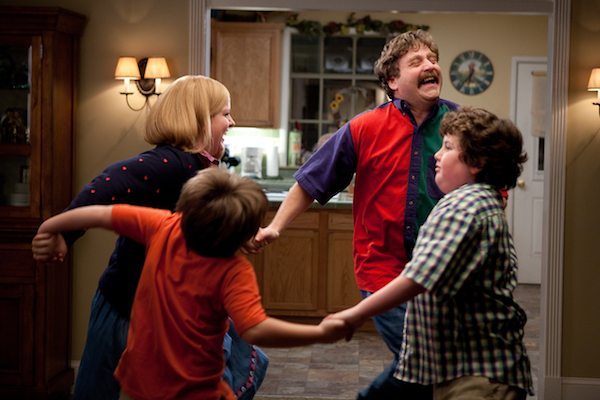


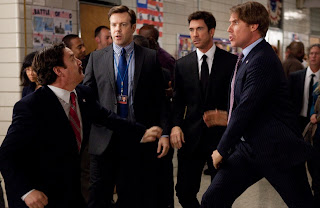

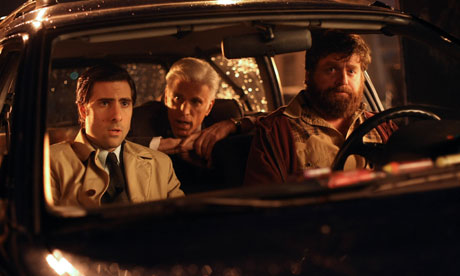

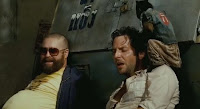




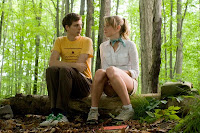.jpg)